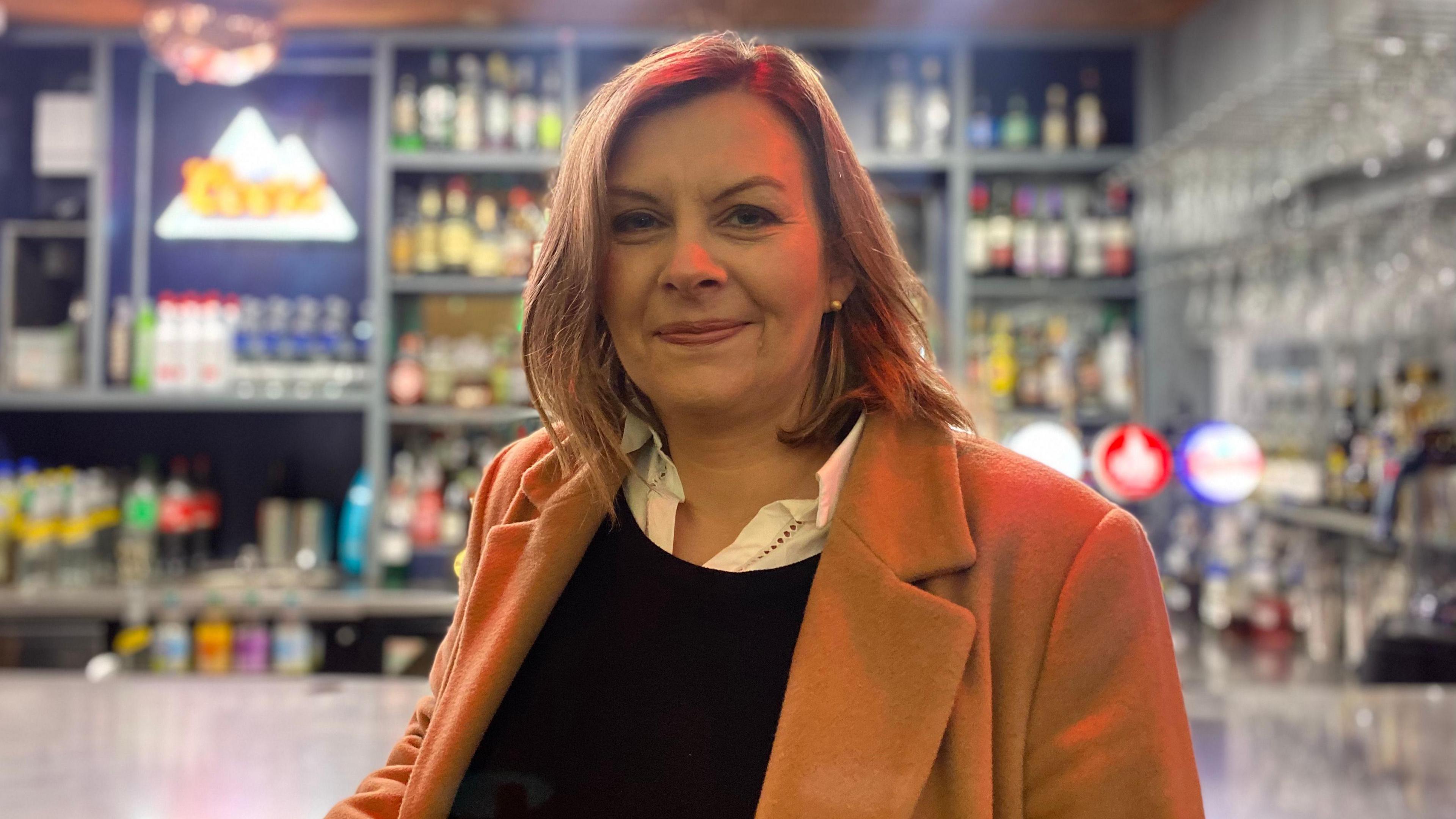'How we stay responsible as boozy brunches boom'

Kate McNally said Haymarket has measures in place to ensure it can run bottomless brunches responsibly
- Published
A boom in the popularity of bottomless brunches is providing a welcome boost to the hospitality industry but must be handled responsibly, it has been warned.
The latest report of the Responsible Promotion and Retail of Alcohol Code in Northern Ireland said the number of bottomless brunches on offer had increased over the past five years.
It said bottomless brunches were not necessarily irresponsible but they must be compliant with the code.
Kate McNally, of Haymarket bar in Belfast, said the set prices of bottomless brunches worked well for those on a budget and provided good value.
"We would have a lot of birthday parties, celebrations, even just friends meeting up," she told BBC News NI.
"They know their food is included in it and there’s no surprise to what they’re having to pay."
'It's not unlimited'
Ms McNally added Haymarket had measures in place to ensure it ran bottomless brunches responsibly.
"We have obviously watched our guidelines and watched for the guidance on what to do," she said.
There is a 90-minute time limit for bookings, customers can have one drink at a time and drinks are served with food.
Non-alcoholic packages are also available - and some sittings include live entertainment or karaoke.
"It’s table service only so you have a server. It’s nice for the customer because you get a rapport with the server, they get to know you," Ms McNally said.
"But they also see how many drinks are going to the table and they can make sure we run as responsible liquor licence holders.
"If you appear to be intoxicated we will stop serving you."
Haymarket's bottomless brunches are pre-booked online and the terms and conditions are clearly specified on the website.
"The alcohol doesn’t just keep coming, it’s not unlimited and that’s clearly stated," Ms McNally added.
She said bottomless brunches attracted a "slightly different crowd" and were important for the industry after the Covid pandemic and the cost-of-living crisis.
Social, good value and 'a bit different'

Alex Laybourne said bottomless brunches are good value for money
Alex Laybourne said the social aspect of bottomless brunches was “really good”, as is the value for money.
She thought one drink at a time was “reasonable” but an overall limit was "a bit unfair unless you’re acting unreasonably”.
Charley Smith said bottomless brunches were “quite fun and a bit different”.
She would prefer a drinks limit over a time limit “because when you get chatting you don’t want to be rushing”.
“I do think it’s probably a good idea for the business to slow us all down,” she added.
Stephanie Beaumont said bottomless brunches were usually “really cheap” and a chance to “get everyone together”.
The last time she did one the drinks limits were “quite strict” and the group she was with “did get a bit annoyed”.
“The more people drink, the rowdier they get and the more drinks they want so I think it’ll be hard for places to manage," she said.
"But if it’s bottomless they can’t just give you endless alcohol.”

Charley Smith said bottomless brunches are something "a bit different"
Responsible promotions
The report from the Responsible Promotion and Retail of Alcohol Code, which covers the period from September 2018 to September 2023, recorded an increase in bottomless brunch promotions.
The Independent Complaints Panel (ICP), which oversees compliance, has issued guidance to hospitality businesses, emphasising that promotions should not encourage people to drink more than they would have otherwise intended.
The ICP has also issued a sample set of terms and conditions which can be used for bottomless promotions.
These include that “bottomless” does not mean an unlimited supply of alcoholic drinks, drinks must be served with food and by table service, and customers can have one drink at a time.
Responsible Promotion and Retail of Alcohol NI chairman Duncan McCausland said the aim of the report was to give guidance to businesses so they could operate bottomless brunches responsibly.
“Obviously, they're trying to provide value for money for customers and a promotion that attracts people in," he told BBC News NI.
"But it has to be done in a fashion that is responsible.

Duncan McCausland empahsised the needs for businesses to host responsible bottomless brunches
“We're not looking to prevent people operating promotions, but we want them to do it in a sensible fashion."
The move to more social media marketing had brought new challenges, he said, with more businesses using TikTok, Instagram or X to promote bottomless brunches.
Businesses may employ social media promoters who are “not fully up to speed with what is or could be potentially irresponsible”, Mr McCausland said.
The code has tried to encourage businesses to ensure those promoting their events “are aware of what is seen and judged to be responsible”.
Mr McCausland said that businesses and promoters wanted "to provide a safe environment" for people to consume alcohol and have a good night out.
"We are just making sure that promotions encourage responsible consumption of alcohol and don't encourage irresponsible consumptions. I think that's very important," he said.
Mr McCausland said there has been “no major difficulty” advising promoters and the “vast majority” of licenced premises “exercised their responsibilities very responsibly”.
'We need to get people in the door'
Ms McNally said it "made sense for every business to try to do it right".
"You want everybody to feed off each other and say Belfast’s a great place to go," she said.
"We hold the liquor licence. We’re responsible for that. I don’t want our venue to have a bad reputation. Nobody does."